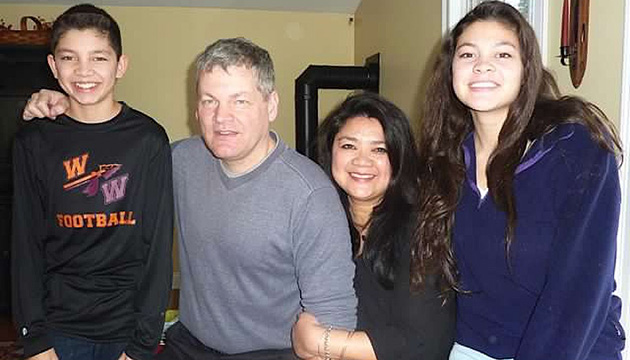Helen was only two when her parents took her to the U.S. and three when they immigrated to Canada. Because her parents worked in international organizations, she grew up aware that people are of many different nationalities and that it’s all right to be different.
When she was a kid, Helen said she used to wonder why she had so many Titos (uncles) and Titas (aunts). When she was planning her wedding, she had to explain the invitation list to her future American in-laws who wondered why her parents seemed to have so many siblings. She had to point out who was the real uncle or aunt by blood and who was related by ritual ties. She has introduced her children to this Filipino practice of extending familial relationships to close friends through bonds of ritual kinship. Her own children have since adopted their father’s childhood friends, and call them the “funcles” as in the “fake uncles” and they treat them with the same care and respect they give to their blood relative uncles.
Asked what Filipino traits she would pass on to her children, Helen said: “There are so many good ones! Respect for elders and family is the number 1 Filipino trait I try to teach my children. I want them to know their place and their role in the family – they are not the boss; they are learning from parents, grandparents, and adult role models. My husband and I care for them and make sacrifices for them and in turn they grow up to be good people and take care of us and their family and their community. Not that our kids are perfect but they know “the look” (that parental glare, which the kids call the “stink eye”) when they see it and they know how to behave.
“The number two Filipino trait that is important to pass on to children is the concept of utang na loob. I try to teach my kids about the importance of reciprocity and establishing a mutually beneficial social relationship. The kids need to learn that society is give-and-take and that they are interdependent in their community. This trait also has overtones of gratitude, respect, and social obligations and is tricky to teach to kids because it is not common in Western culture but well worth the effort to teach.
“At number three is hospitality. I try to teach my children to be welcoming and gracious to visitors and respectful of guests. I want them to be considerate of the needs of others – like giving up their room when Lolo and Lola come to visit or letting a playmate take the first turn with a toy if they are at our house, or not showing up empty-handed when invited to a friend’s house. I guess most people associate hospitality and generosity with Filipinos. I like that and I am proud of it.
“My number four favorite concept is hiya. I can think of many choices I had made because I didn’t want to bring embarrassment or shame to myself or my family. I certainly would like my kids to consider “what would my mother think” when they are faced with a tough decision. To say that someone is walang hiya is derogatory indeed. I think a lot of people could benefit from being more conscious of hiya and try to maintain dignity and decency. So much of today’s reality TV shows fall under the category of ‘Have you no shame?’ or “Yikes, what would your mother think if she saw you?”
Since her kids are growing up in a Western culture that puts a premium on being assertive and outspoken, Helen worries that her kids would be at a disadvantage if they follow the Filipino trait of being always accommodating to preserve social harmony. She finds the Filipino trait of always saying “yes” even when they mean “no” a disadvantage. She said it may save face in the Philippines where everybody knows the rules but those rules don’t apply in North America where “yes” is yes and “no” is no. Thus she teaches her children to say what is really on their minds. She encourages them to speak frankly but politely.
Helen says that whether they realize it or not, American Filipino children and Canadian Filipino children are heirs to a wealth of Philippine traditional values and beliefs even as they are growing up in a Western society that has its own specific values and traditions. As they mature, they develop their own personal values that they use as guiding principles in their lives.



